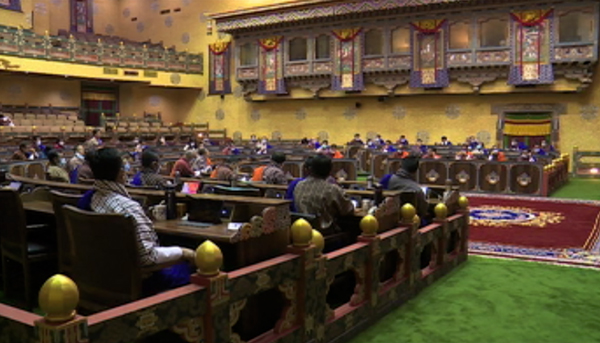 The National Council members are disappointed with the Speaker’s decision to defer the deliberations on the Mines and Minerals (Amendment) Bill, 2020 indefinitely. The National Council’s Chairperson Tashi Dorji said the Bill is now as good as a Dead Bill adding it is not a fair decision.
The National Council members are disappointed with the Speaker’s decision to defer the deliberations on the Mines and Minerals (Amendment) Bill, 2020 indefinitely. The National Council’s Chairperson Tashi Dorji said the Bill is now as good as a Dead Bill adding it is not a fair decision.
“After discussing it for so many years, nobody will be satisfied with the decision today. Even I feel sad that we couldn’t pass the bill during my tenure. It would have been fulfilling had we deliberated on the bill as per the Constitution and for the benefit of the country and people,” said the National Council’s Chairperson Tashi Dorji.
The joint committee on the Mines and Minerals (Amendment) Bill failed to present a report on the Bill to the Parliament as its members could not come to a consensus despite several meetings. As per the agenda, the joint sitting was supposed to deliberate on the Bill for three days beginning today.
“In the joint committee, we said those highly profitable minerals such as Dolomite and Coal should be given to the SoEs. However, some said that all minerals should be given to the State. That is why we couldn’t come to a consensus,” said Kinley Wangchuk, Chairperson of the joint committee.
Following disagreements between the members of the two houses over amendments including the principle and application of the Bill, the National Assembly, during the fourth session of the third Parliament, proposed to form a joint committee to discuss the Bill.
Many Parliamentarians in the joint sitting, today, insisted that the deliberations should continue. The members of the parliament also proposed the Speaker decide the deferment through voting.
“The committee should have presented a report on the pros and cons of SoE operating the mines and minerals and also on the mixed-mode as proposed by the NA. It would have helped us to make a decision,” said Passang Dorji (PhD), Member of Parliament from Bartsham-Shongphu, Trashigang.
“According to Article 13.8 of the constitution, nothing is mentioned about the deferment of a Bill. And the Kasho from His Majesty also doesn’t say anything about the deferment of the Bill. We have to decide by voting,” said Eminent Member Ugyen Tshering.
According to the Speaker, the Bill can be tabled as a Private Member’s Bill or Government Bill after six months.
As per Section 59A of the Legislative Rules of Procedure, “the Speaker defer the Bill from voting and such bill may be reintroduced in future following due legislative process”.
“We have common Rules of Procedure both in NA and NC. As per the Rules of Procedure, since there is no recommendation from the committee there is no point in voting. If we are to declare the Bill as a Dead Bill, we need to vote,” said Speaker Wangchuk Namgay.
Some of the Members of Parliament of the ruling party supported deferring the deliberations on the Bill.
“We have to follow the Rules of Procedure. We don’t have to discuss much on whether it is against the constitution or not. It is better if we give some cooling period,” said National Assembly’s Member of Parliament from Bongo-Chapchha, Chhukha.
“If we vote or decide on the Bill without knowing much about the Bill, it will undermine the essence of the Bill. It might affect the country and the people,” added Ugyen Tenzin, National Assembly’s Member of Parliament from Bji-Kartshog-Uesu, Haa.
The National Assembly and the National Council were at loggerheads over the Mines and Minerals (Amendment) Bill, 2020. The contention over the Bill is that the National Assembly proposed to give rights to the state, private sectors and community through broad-based ownership. On the other hand, the National Council wants the State-owned Enterprises to run all the mines to prevent wealth concentration among few private individuals.
During a press conference last week, the National Council made its stand clear that it will stick by the Constitution while deliberating on the Bill in the joint sitting. The house’s Eminent Member Dasho Tashi Wangyel quoting Article 1.12 of the Constitution, “the rights over the mineral resources, rivers, lakes and forest shall vest in the state, and are the properties of the state, which shall be regulated by the law,” said that the Mines and Minerals Management Act, 1995 should be amended as per the Constitution.
The Royal Audit Authority’s performance audit report 2014 also showed inadequacies in the legal, institutional and regulatory framework governing the mining sector that resulted in huge revenue shortfalls and irregularities.
Samten Dolkar/Sangay Chezom/Tshering Zam







